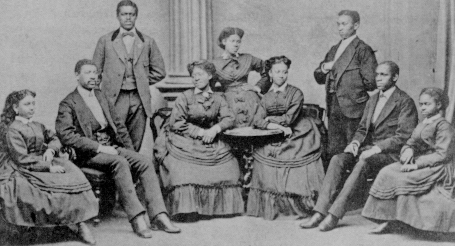FISK JUBILEE SINGERS (1871- )
In 1871, hoping to raise funds for Fisk University, school treasurer
and music teacher Geoff L. White borrowed money and set out with nine student
singers for a tour despite the disapproval of the university.
Withstanding hardships and indignities, this nameless and almost penniless
group persevered against all odds to save their school from bankruptcy
and closure. The singers ranged in age from fifteen to twenty-five years
and all were former slaves or children of slaves.

Financially unsuccessful at first, the group abandoned its classical,
popular repertoire for powerful, moving spirituals and slave songs. The
group also adopted the name of Jubilee Singers, from the biblical reference
to the time of jubilee and the freeing of all slaves.
The group's manager, George White, was without musical training himself,
but he was a fine singer, was dedicated to music, and had the added talent
of getting the utmost from his gifted singers. Soon the power and eloquence
of their music was entrancing and inspiring audiences, which always cheered
for encores.
After several tours throughout the United States and Europe, the Jubilee
Singers eventually raised $150,000, securing the school's future. The funds
purchased Fisk's present campus (old Union Fort Gillem) in North Nashville
and built Jubilee Hall, the first permanent building in America for the
education of blacks (now designated as a national historic landmark).
Begun as a free school providing primary through college education for
newly freed slaves, Fisk was founded in 1866 by the Congregational Church's
American Missionary Association, the Western Freedmen's Aid Commission,
and former Union Army General Clinton B. Fisk of the Freedmen's Bureau.
Its only buildings at first were abandoned Union Army barracks.
Each October 6, Fisk celebrates Jubilee Day, commemorating the original
Jubilee Singers, who sang before kings, queens, and heads of state; who
captured the hearts of all who heard their music; who introduced to the
world the beauty and tradition of the Negro spiritual; and who, with steadfastness
and commitment, virtually saved their university.


